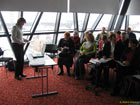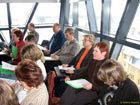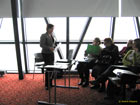Nature conservation in the countryside: possibilities set in the Rural Development Plan Workshop for nature conservation in the countryside from the perspective of the Rural Development Plan was held on March 7. It was organized as part of the LIFE-Nature project Restoration of Floodplain Meadows for EU species and habitats; the event was attended by representatives of municipalities that are partners in the project.  | | I.Skudra informs about | | about the state subsidies | Nature conservation in the countryside: possibilities set in the Rural Development Plan Workshop for nature conservation in the countryside from the perspective of the Rural Development Plan was held on March 7. It was organized as part of the LIFE-Nature project Restoration of Floodplain Meadows for EU species and habitats; the event was attended by representatives of municipalities that are partners in the project. The one-day workshop offered municipality leaders, rural consultants and representatives of partner institutions a chance to learn about agriculture and nature conservation. The event took place in Riga, hotel Alberts, and it was attended by 31 participants from across Latvia. The aim of the workshop was to offer municipalities comprehensive information on newest issues pertaining to rural developments and to encourage discussion of the Rural Development Plan that is currently being prepared. Participants were also encouraged to think about environmental, sustainable and nature-friendly management methods. The seminar was chaired by the public relations coordinator of the project, Andris Klepers. At first the participants leant more about the latest developments in the project on Restoration of Floodplain Meadows. Namely, management plans have been completed for half of the project areas; significant habitat restoration activities have taken place, and information boards and leaflets are in a planning stage. Project overview was followed by news about the state subsidies and financing from the Structural Funds available in 2006, presented by Ilze Skudra and Anita Andersone from the Rural Consultation and Information Center. Ilze Skudra also informed about the terms for receiving direct payments for agricultural lands. The audience demonstrated great interest also in the next topic nature conservation requirements for land management in rural areas. Many of the presentations, especially those covering cattle breeding, were particularly detailed and offered the audience a chance to learn | 
| | Alltogether 31 participants | | from across Latvia participated | many new terms. Most valuable this information was for rural consultants who encourage farmers to practice nature-friendly land management. The speaker pointed out discrepancies in intensively managed lands: only 4% of farms have over 50ha of agricultural land, yet this small percentage of farms manages over 60% of all valuable agricultural lands. In the second part of the workshop Ilze Skudra continued presenting the agro-environmental section of the Rural Development Plan. Statistics for 2005, practical experience of municipalities and future developments of the Plan were among topics that triggered active public discussion. Having overcome some technical difficulties, the floor was given to the Head of the Latvian Fund for Nature Council, Ivars Kabucis, who talked about detecting biologically valuable grasslands. The audience got a botany lesson as well as learnt about the latest inventory of biologically valuable grasslands. Municipalities also obtained information about the results of this survey within their territory. A lot of questions were posed on topics such as methodology, practical expertise and difference between biologically, botanically and ornithologically valuable grasslands. The presentation could be found here, but the audience also received additional pertinent information. The final presentation of the seminar was given by the senior officer of the Ministry of Agriculture, Aiva Zvirbule, and it covered the Rural Development Plan for the 2007-2013 planning period. European rural development guidelines, the new Rural Development Plan, stakeholder involvement in implementation of the requirements were among topics that triggered lively discussions at times even interrupting the speaker. The new Rural Development Plan is based on three key objectives: - Increased competitiveness of agriculture and forestry sector
- Improvement of the environment and rural landscape
- Improvement of the quality of life in rural areas and diversification of economy.
The three objectives will further be strengthened by another one the LEADER, which is designed to foster reaching the set priorities. The presentation encouraged a vivid discussion and many practical questions, which can not be answered while the Plan is still in its preparation. For instance, meeting the set requirement for the number of cattle (0.2 unites/ha) in large farms (>30ha) currently develops conditions for an uneven split of support payments to less developed agricultural areas.  | | A.Zvirbule from Ministry | | of Agriculture informs about | | political aspects | When finalizing the lively discussion, Aiva Zvirbule informed the audience that the new Rural Development Plan for Latvia has to be ready by June. Then it will be sent to Brussels for review. Until then everyone can submit comments on this document to the speaker herself by emailing to Aiva.Zvirbule@zm.gov.lv or by taking part in the working groups. More information is available in the home page of the Ministry of Agriculture. Andris Klepers | 






